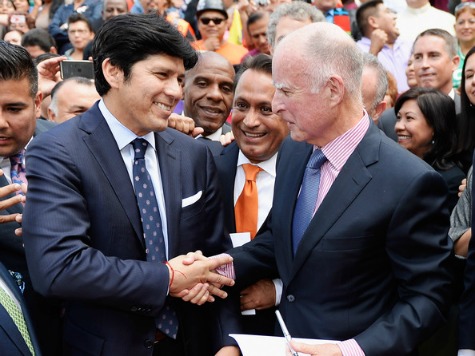
It’s been a whirlwind month for Gov. Jerry Brown–four weeks in which the California chief executive’s desk saw an anti-paparazzi bill and a bill to allow non-physicians to perform abortions, and he himself lofty praise in Rolling Stone.
The latest bill to pass his desk, granting illegal immigrants the ability to apply for driver’s licenses in the state, is “only the first step” of a national movement, the governor told a crowd yesterday.
The bill–now law–had sat at the governor’s desk before but was rejected by Governor Arnold Schwarzenegger. Gov. Brown, in contrast, welcomed the change as giving undocumented California residents the ability to drive “legally and with respect,” an acknowledgement of “people who by their fervor, their faith, and their numbers transformed California.”
Some illegal immigrants were already allowed to apply for driver’s licenses had they arrived in the state as children; that distinction will end, as per this bill, in 2015. Whether the licenses would count as government identification for the purposes of other social services remained unclear at the bill’s signing, though the law provides the licenses must be distinguished by label and will not count as valid federal identification.
California joins New Mexico, Oregon, and Washington, among other states, and Gov. Brown made it clear he hopes other states follow California’s footsteps, calling the law “only the first step” and hoping it inspires other states to follow. That all depends on what the new burden on California’s Department of Motor Vehicles will be–in human terms, an estimated 1.4 million new drivers, according to the LA Times. The Times adds that the DMV is considering opening up to six new offices to handle these numbers within three years.
The reception to the idea in states already granting these limited-use driver’s licenses is mixed. Gov. Susana Martinez of New Mexico has ardently advocated for the repeal of the law, arguing that it serves as a magnet for illegal immigrants from other states who come to New Mexico and fraudulently acquire them. While the number of insured drivers on the road has increased only slightly in the three years since the state’s law passed, requests for these licenses have dropped 21%.
Meanwhile, many argue that the licenses do little other than encourage reckless drivers. Don Rosenberg, who testified against the law in California and lost a son to a driver without proper documentation, told the legislature that “fatalities went up, collisions went up” in New Mexico due to these licenses.
With more than a year until the licenses are available, California must now organize the logistics and prepare law enforcement appropriately–and must watch the impact of said laws on states already providing them.

COMMENTS
Please let us know if you're having issues with commenting.